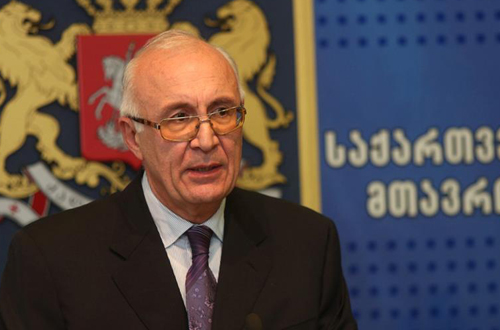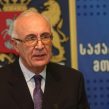
Georgia’s Reset and Russia’s Response (Part Four)
Publication: Eurasia Daily Monitor Volume: 10 Issue: 114
By:

One major assumption behind the new Georgian government’s Russia policy holds that Georgia might regain its Russian-occupied territories in the future through a negotiated solution. This presupposes making Georgia an attractive country to the occupied territories’ populations; de-isolating them to broaden their options; and—if those processes work out—ultimately re-creating Georgia’s territorial integrity in some new form by negotiations that would necessarily involve Russia. President Vladimir Putin’s latest statement on June 11 seems to imply that this issue may eventually be reopened (see below).
Unless and until that ultimate stage is reached, however, the Georgian government avoids being drawn into bilateral talks with Russia about issues affecting the occupied territories. At least some of this coalition government’s members understand that Moscow could use such bilateral talks to kindle illusions about reuniting Georgia in some confederative form under Russian guarantees. Such talks bilaterally with Russia could become the slippery slope toward trade-offs at the expense of Georgia’s Western orientation (see EDM, June 11–13). ?
Accordingly, Tbilisi uses the existing international frameworks to handle all issues affecting the occupied territories, separating that agenda from the bilateral resetting of Georgia-Russia relations. Promptly upon taking office, Prime Minister Bidzina Ivanishvili appointed in November 2012 Zurab Abashidze, a former ambassador in Moscow and scion of the Soviet-era academic elite, as the Georgian prime minister’s special envoy for relations with Russia (see EDM, November 13, 2012). Denoting the new government’s serious intentions to improve bilateral relations, this appointment has placed Georgia’s Russia policy directly under Ivanishvili’s control, above the foreign affairs ministry’s level. Abashidze has held three full-fledged meetings thus far with his Russian counterpart, Grigory Karasin, the state secretary and deputy foreign affairs minister.
Karasin, however, concurrently represents Russia at the International Geneva Discussions on Security and Stability in the South Caucasus, the highest-level forum dealing with the Russia-Georgia conflict and the situation on the ground. Karasin’s double assignment can make it difficult for Tbilisi to separate its bilateral relations with Russia from political issues related to the occupied territories.
Russia takes the position that it is up to Georgia’s new government to initiate a resumption of diplomatic relations. The former government had broken relations following Russia’s invasion of Georgia and “recognition” of Abkhazia and South Ossetia in 2008.
According to Abashidze, however, the resumption of diplomatic relations cannot be discussed unless Russia and Georgia achieve some “serious breakthroughs” regarding Abkhazia and South Ossetia (24 Saati, June 8). Such breakthroughs are not publicly specified but may well refer hypothetically to Russian de-recognition of Abkhazia and South Ossetia, or a negotiated solution to their political status in the future (see above). Georgia’s new government adheres at least for the time being to the former government’s position, that it cannot restore diplomatic relations with Russia as long as Russia maintains embassies in Sukhumi and Tskhinvali.
When Russian border troops from South Ossetia installed barbed-wire fences in Georgian territory beyond the occupation line (see EDM, June 3, 12, 13), Tbilisi found it hard to decide whether to raise this issue in the scheduled talks with Karasin. Failure to raise the issue could look like acquiescence, while raising it would risk blurring the difference between the multilateral Geneva Discussions and the Tbilisi-Moscow bilateral talks. In the event, Abashidze raised it under the guise of a humanitarian issue affecting local villagers. Karasin predictably urged Georgia to demarcate the “border” with South Ossetia by agreement with the latter’s authorities (Interfax, Civil Georgia, June 6). Similarly, in the Geneva forum, Russia and its South Ossetian proteges propose the creation of a Georgia-South Ossetia commission for “border” demarcation and dispute adjudication. No conceivable Georgian government would take such steps as would amount to recognition of a “border” and implicitly of South Ossetia.
Georgia’s Western partners have responded inadequately to the Russian barbed-wire fence construction inside previously uncontested Georgian territory (see EDM, June 12). The European Union’s Monitoring Mission did not monitor those sectors in a timely manner; it merely confirmed the start of construction after the fact. The consensus-based (i.e., internally veto-bound) Incident Prevention and Response Mechanism could neither prevent nor respond in this case. The European Union made no high-level statement out of Brussels; merely a phone call from the EU’s special representative Philippe Lefort to Karasin, who waved it off lightly (Interfax, June 3). The Geneva Discussions could not convene earlier than the regular meeting scheduled for June 25–26, four weeks after the start of the fence construction by Russian troops. The United States avoided speaking up. Only the North Atlantic Treaty Organization (NATO) reacted strongly, albeit merely verbally, through Secretary-General Anders Fogh Rasmussen during Georgian Defense Minister Irakli Alasania’s Brussels visit, coinciding with heavy casualties suffered by Georgian troops in Afghanistan.




